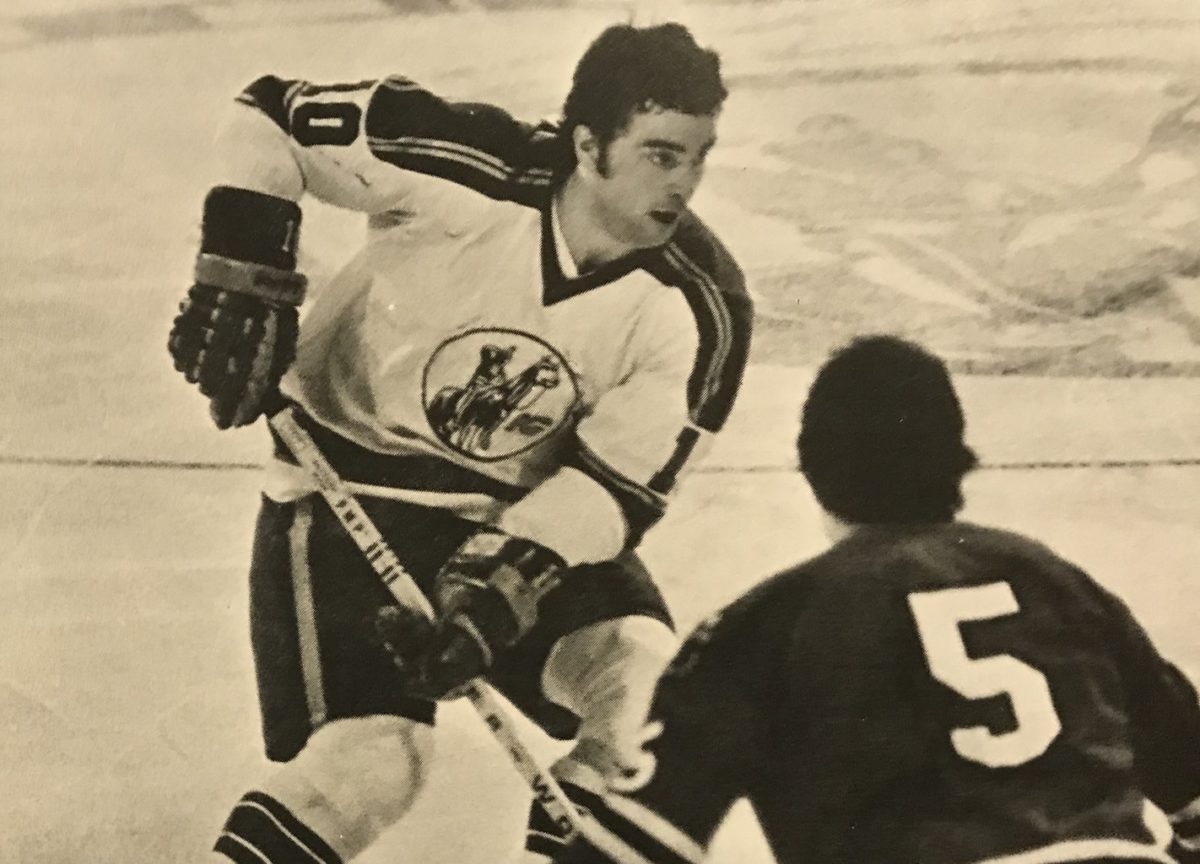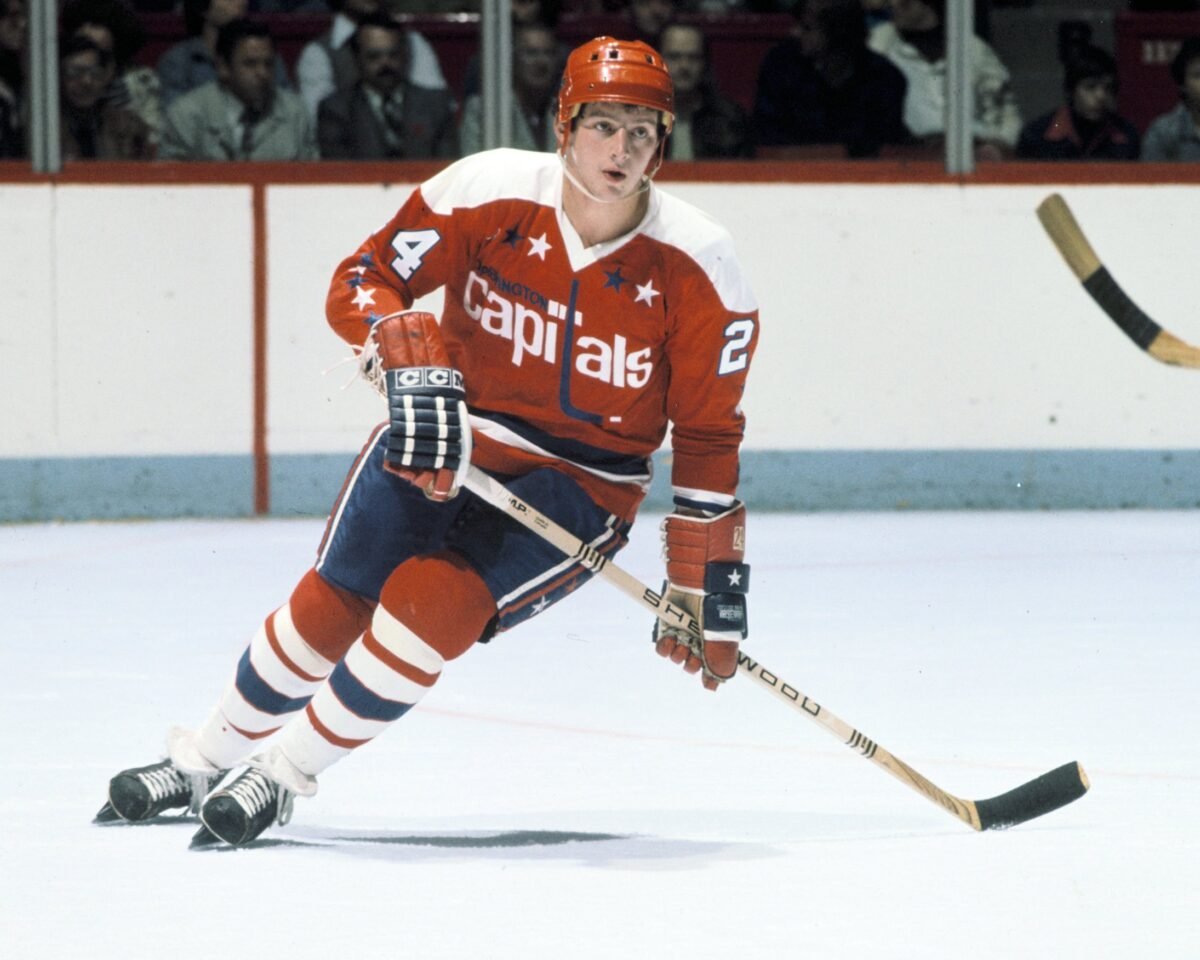The Washington Capitals have held the third overall pick in the NHL Entry Draft only once in their franchise’s history. It was back during the 1977 Draft. After center Dale McCourt went first overall to the Detroit Red Wings and defender Barry Beck was chosen by the Colorado Rockies, the Caps chose defenseman Robert Picard. Picard had previously played for the Montreal Juniors in the Quebec Major Junior Hockey League (QMJHL). At this point, the Caps were trying to draft their way into becoming a contender in the NHL. Before selecting Picard, the Caps had the first overall selection for the 1976 NHL Amateur Draft, where they picked blueliner Rick Green. This was after already having the first overall pick in 1974 when they selected defenseman Greg Joly, too. Capitals management hoped that, in Picard, they would have someone who could help take command of the team from the backend and be a core piece to the puzzle in building a Stanley Cup-contending roster in Washington.
Montreal Juniors Tenure and Becoming a Capital
Picard joined the Juniors before the 1973-74 QMJHL season. The franchise was then called the Montreal Bleu Blanc Rouge, which was then changed to Juniors after the 1974-75 campaign. Some of Picard’s teammates while he was there in his rookie season for the club were future NHL forwards and head coaches Rick Bowness and Mario Tremblay. In his first season, Picard tallied seven goals and 46 assists for 53 points in 70 games. He followed that up in 1974-75 with 13 goals and 74 assists for 87 points in 70 contests. He was a significant contributor offensively, considering he was a defenseman. He was a weapon that complemented the other talent around him, which is why during his last season in the QMJHL for the now-called Juniors, Picard notched 92 points in 70 games. Below are all of the numbers he posted while he was in the QMJHL:
- 1973-74 Montreal Bleu Blanc Rouge: seven goals and 46 assists for 53 points in 70 games
- 1974-75 Montreal Bleu Blanc Rouge: 13 goals and 74 assists for 87 points in 70 games
- 1975-76 Montreal Juniors: 14 goals and 67 assists for 81 points in 72 games
- 1976-77 Montreal Juniors: 32 goals and 60 assists for 92 points in 70 games
Once Washington drafted Picard, he was officially playing for the Caps. His time with the Juniors was over. As great as he was for Montreal, he needed to help improve the Caps on the blue line. The Caps needed all the help they could get. They finished the 1976-77 campaign with a 24-42-14 record. The leading goal scorers for them that season were Guy Charron, who had 82 points in 80 games; Gerry Meehan with 64 points; Hartland Monahan with 50 points in 79 games; and Garnet “Ace” Bailey with 46. The defense consisted of Yvon Labre, Green, Jack Lynch, Gord Lane, Bryan Watson (acquired from Detroit for Joly), and Gord Smith. Picard was going to come in and hopefully gel with his new teammates, and hopefully, they could put together some success and eventually take some shots at winning a Cup.
A Messy Contract Situation
Before Picard joined the Caps, he had tried to go to the World Hockey Association (WHA) to play with the Quebec Nordiques. However, the WHA would not approve Picard’s contract with Quebec, and things got rough. Robert Fachet of The Washington Post discusses in his article, “WHA Bars Picard Deal,” about the legal battle that took place. Fachet wrote, “The World Hockey Association refused today to approve the Quebec Nordiques’ contract with Robert Picard, thereby acknowledging the validity of the Washington Capitals’ prior agreement with the 20-year-old defenseman.” (From ‘WHA Bars Picard Deal,’ The Washington Post, Sept. 23, 1977).
Fachet went on and wrote, “However, Guy Bertrand, Picard’s lawyer, said by telephone from Quebec City that he would file a $1-million suit against the WHA and also would seek to have the Maryland courts vote Picard’s agreement with the Capitals’ on the grounds of ‘false representation on one part and a seduction operation by the Washington Capitals in another.’ Bertrand said Picard would stay in Montreal rather than report to the Capitals.” (From ‘WHA Bars Picard Deal,’ The Washington Post, Sept. 23, 1977). This whole situation already showed Picard in the worst light. It was a situation involving many parties that just was not necessary. He had agreed with the Caps before trying to go to the Nordiques. He had committed, and Fachet explained that further in his piece.
Related: The WHA – A Look Back at the Upstart Hockey League
Fachet wrote, “Picard, accompanied by his parents, signed his agreement with the Capitals on Jun. 13, moments before Washington selected him in the first round of the NHL draft, as the third player chosen…On Sept. 12, Picard, now represented by Bertrand, signed the contract with Quebec. That it was a sudden shift was indicated by the fact that the same day he agreed to terms with the Nordiques, the Capitals received a transportation questionnaire postmarked four days earlier, stating the date on which he planned to drive to training camp…Picard has been kept in virtual seclusion by the Nordiques, and his only comments, made on two separate occasions, were vows that he would never play in Washington” (From ‘WHA Bars Picard Deal,’ The Washington Post, Sept. 23, 1977).
Picard went to Washington in the NHL instead of Quebec in the WHA. It was not the prettiest situation, but with it now in the past, Picard could focus on playing hockey and doing his best to help make the Caps better.
Picard’s Time in D.C.
Picard fit right in his rookie season. He led all Caps defenders in points (37) for 1977-78 and was fourth on the entire roster in that category. Only Charron (73), Bob Sirois (61), and Meehan (43) had more than him. Picard provided 10 goals and 27 assists in 75 games. Unfortunately, the team’s results got worse than in 1976-77, with the club finishing with a record of 17-49-14 to finish the year.

Then, Caps general manager Max McNab drafted forward Ryan Walter second overall in the 1978 Draft, and he also swung a trade with the Minnesota North Stars to acquire skilled forward Dennis Maruk to try to spark the offense. Maruk led the Caps in scoring in 1978-79 with 90 points in 76 games (31 goals and 59 assists), while Walter had 55 points in his rookie season in 69 games (28 goals and 27 assists). Picard, meanwhile, led all defensemen in points again and increased his overall point production by 28. He had 21 goals and 44 assists for 65 points in 77 games. The team, though, finished with a record of 24-41-15. It was apparent already that despite how good Picard was, the overall Caps team was not getting enough results on the ice.
Picard played in one more season for Washington. He had 11 goals and 43 assists for 54 points in 78 games. The team again got more reinforcements on offense as GM McNab drafted winger Mike Gartner and put him in the Caps offense. Despite Gartner’s immediate 68-point campaign as a rookie and a point increase from Walter (66 points), the Caps finished in last place in the Patrick Division with a record of 27-40-13. They were not getting enough improvement as a team.
Eventually, if things continue not to change, even talented players may find themselves moved out. As great as some individuals are on a team, sometimes a change is needed to improve the whole team. Picard was one of those players who put up solid numbers but was traded to try and help fix the issues in D.C. Picard was dealt to the Toronto Maple Leafs, along with Tim Coulis, a 1980 second-round pick for goalie Mike Palmateer, and a third-round selection in 1980.
Picard’s Canadian Tour
Picard spent parts of the next 10 seasons playing with different teams up in Canada. He started as a Leaf for the 1980-81 campaign but did not last one entire season before he was traded to the Montreal Canadiens. With Toronto, Picard had suited up for 59 games and accrued six goals and 19 assists for 25 points in 59 contests. Picard spent a few seasons with the Canadiens but was not scoring goals there as he had with the Caps. He still racked up his share of assists, but he was not getting as many goals as he did in D.C. Here are his stats with Montreal:
- 1980-81: two goals and two assists for four points in eight games
- 1981-82: two goals and 26 assists for 28 points in 62 games
- 1982-83: seven goals and 31 assists for 38 points in 64 games
- 1983-84: two assists in seven games
During the 1983-84 season, Montreal traded Picard to the Winnipeg Jets for a third-round pick in the 1984 NHL Draft. That pick, which the Jets traded to the Canadiens, was significant because Montreal used it to draft future Hockey Hall of Fame goalie Patrick Roy.
Picard was with the Jets for parts of three seasons. The only entire season he was in Winnipeg, he notched 12 goals and 22 assists for 34 points in 78 games. He was traded in the middle of the 1985-86 season to the Nordiques. Picard could finally play for the franchise he tried to go to before entering the NHL. As a Nordique, Picard still put up good numbers. Below are his regular-season stats with Quebec:
- 1985-86: seven goals and 27 assists for 34 points in 48 games
- 1986-87: eight goals and 20 assists for 28 points in 78 games
- 1987-88: three goals and 13 assists for 16 points in 65 games
- 1988-89: seven goals and 14 assists for 21 points in 74 games
- 1989-90: five assists in 24 games
Picard’s last season as a pro came in 1989-90. He spent part of it in Quebec before moving one last time in his career. After spending many seasons donning various Canadian NHL team jerseys, Picard was back in the U.S. when he was traded to the Detroit Red Wings. He suited up for 20 games in Detroit, getting three assists. Following the end of the 1989-90 NHL season, Picard hung up his skates. He finished his career with 104 goals and 319 assists for 423 points in 899 games.

Looking back, Picard did well when he joined the Caps. He put up great offensive numbers and was doing everything well. The problem was the results of the whole team. Picard was a good piece to a bad puzzle. There were quite a few good puzzle pieces that just did not fit together based on the results. Picard was very good, Walter was good, Maruk was good, and Gartner coming in was significant. It just was not enough to change the results on the ice in the win column. He made a difference, though; the ugly contract dispute earlier became a forgettable part of the past. The Caps of the 1970s were trying to find their way to contender status. Picard ended up being a great get in the draft, but it just did not do enough to dramatically change the woes for the entire team.
